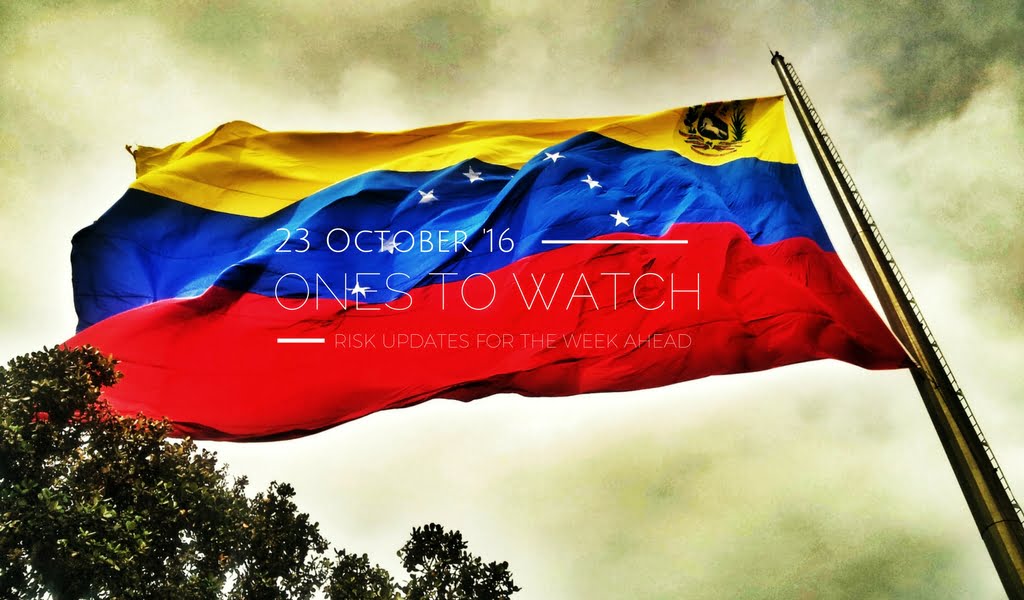Americas: Tension in Venezuela scales-up
Sectors: all
Key Risks: political instability; social unrest; political violence
In Venezuela, political and social tensions are set to increase over the coming week with a potential for associated violent unrest across the country’s main urban centres. The opposition MUD coalition called on Venezuelans to peacefully take to the streets on 26 October to protest against the electoral authorities’ decision to suspend the process to launch a recall referendum against President Nicolas Maduro. On 23 October the opposition-led National Assembly declared Maduro had staged a coup d’état and broken constitutional law, and decided on plans to debate the constitutionality of Maduro’s presidency at an extraordinary session scheduled for 25 October. The NA also urged the military not to respond to orders that would go against Venezuela’s Constitution. All rallies should be avoided due to the high risk of clashes between rival activists, and between the latter and the security forces.
Asia-Pacific: Beijing slow in addressing vulnerabilities
Sectors: all
Key Risks: economic recession; global downturn
The Chinese economy expanded by 6.7 per cent in Q3 2016, in line with the government’s target for the year overall. However, there are questions over the accuracy of the data, and it remains possible that growth is up to 2 percentage points lower. Even if the figures are accurate there are concerns. Credit growth continues to grow faster than GDP, and real estate prices are still expanding at unsustainable levels. There are minor signs of rebalancing, although vulnerabilities continue to grow. Slowing credit growth risks hampering growth, and at least thus far Beijing appears to be prioritising to maintain the economy’s expansion over addressing longstanding vulnerabilities. While a ‘hard landing’ is still unlikely, without an acceleration in reforms, risks to China and the global economy will continue to rise.
Eurasia: Concerns over Bashneft’s minority shareholders’ rights following Rosneft purchase
Sectors: oil & gas
Key Risks: shareholders’ rights
Following Rosneft’s purchase of the Bashkortostan region’s 50.07 per cent stake in Bashneft on 12 October, concerns have arisen regarding how the company will treat its existing minority shareholders. Under Russian law, Rosneft has until 17 November to buy out minority shareholders and the offer must be of an equal premium to that paid to the state, which would be roughly 218.3bln rubles (US$3.5bln). Yet there are concerns shareholders will be forced to accept a lower price as the legislature is scheduled to consider a bill in early November that would exempt price requirements if a company purchases another on the orders of the government. Rosneft was formally ordered to do so by the state and the law, if passed, would apply retroactively. Should the law be passed, it would raise major concerns over shareholders’ rights in Russia going forward.
Europe: Spain’s electoral stability heads to an end but budgets to remain difficult
Sectors: all
Key Risks: political instability; legislative blockade
Spain’s Socialist Party voted to allow Acting Prime Minister Mariano Rajoy to form a minority government on 23 October. Rajoy is expected to do so later this week thereby avoiding a second re-run election. The Socialists and Rajoy’s Popular Party are historical rivals but the 20 December 2015 and 26 June 2016 parliamentary elections left a hung parliament alongside the rise of the leftist Podemos and centrist Ciudadanos parties. While electoral uncertainty has not significantly impacted the economy to date, Rajoy could face major difficulties in passing a budget. The Socialists are likely to resist efforts by the government to pass additional austerity measures. While early elections this year will now likely be avoided, there is a high likelihood of an early election being called over budgetary issues in the coming years.
MENA: A not so sweet Egyptian sugar crisis
Sectors: private sector
Key Risks: confiscation
The Supply Ministry confiscated sugar stocks from a factory in Beni Suef operated by Edita, one of Egypt’s largest food producers. Sugar supplies are scarce nationwide. Further confiscations of privately-held sugar supplies are possible over the coming week. The government has struggled to secure sufficient supplies of key food staples in recent months. The government has blamed the sugar shortage on artificially inflated prices through hoarding, although the persistent lack of sufficient foreign currency is hampering the government’s efforts to secure supplies of key staples before the central bank devalues the Egyptian Pound, expected by the end of the year. The central bank could delay the adjustment, although the difficult economic conditions will prevail whatever the policy decisions.
Sub-Saharan Africa: The beginnings of an Africa withdrawal from the ICC?
Sectors: all
Key Risks: civil unrest; deteriorating diplomatic relations
On 19 October Burundi became the first country to begin the process of leaving the International Criminal Court (ICC). Anti-ICC sentiment has increased across Africa, with allegations of the court exclusively targeting the continent. Burundi’s decision was swiftly followed by South Africa’s on 21 October, which cited the incompatibility of the Rome Statute with the country’s Diplomatic Immunities and Privileges Act, highlighted by the failure to arrest Sudanese president Omar al-Bashir during his visit in 2015. South Africa’s decision to withdraw has prompted widespread public condemnation. Opposition party, Democratic Alliance (DA) is expected to file an urgent application to the country’s constitutional court to challenge the decision. A review will likely take place in the coming weeks, and a parliamentary vote cannot be ruled out. However, it is likely that a precedent has been set for other African states to withdraw from the ICC.



